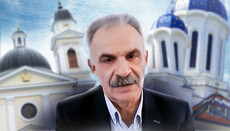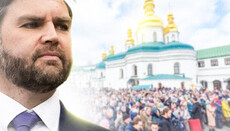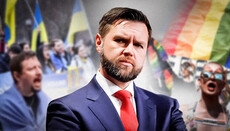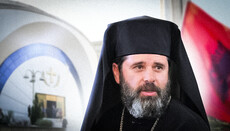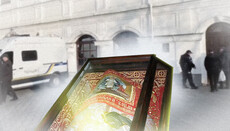Was the UOC pro-Russian? A view from the outside
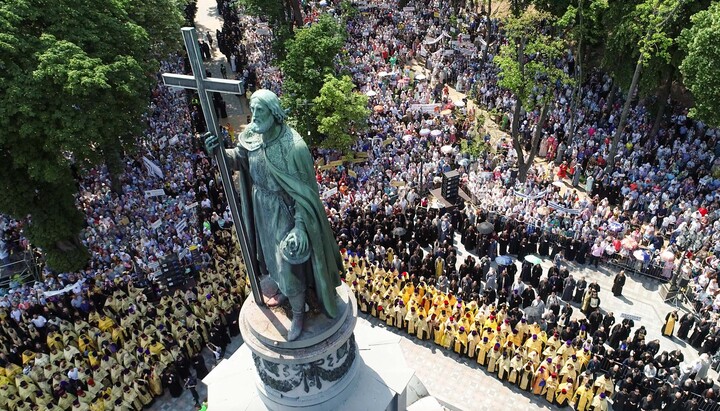
From outside, actions to persecute the UOC seem detrimental, subversive and anti-Ukrainian.
I am Belarusian. Now I’m living and working in Lithuania. I am not a member of the Ukrainian Orthodox Church. In Vilnius I visit a community seeking rapprochement with the Patriarchate of Constantinople. The Vilna-Lithuanian diocese of the Russian Orthodox Church considers it schismatic. I have no motive to deliberately take sides. My confessional and religious views will not suffer in the least either from a critical view of the Ukrainian Orthodox Church or from a critical attitude towards its opponents (the Orthodox Church of Ukraine and others).
In response to this publication, some people may rightly remark to me: “It’s none of your business!” That's right: it's none of my business. Nevertheless, this is precisely why, I believe, the perspective of a person who is not immersed in the melting internal Ukrainian religious controversy, who is not corrupted by any of its sides, could be valuable.
***
It is widely believed in the mass consciousness that before the full-scale invasion of Russia on February 24, 2022, the Ukrainian Orthodox Church supported the side of Russia and the LDNR in the conflict in the South-East of Ukraine, and only the war forced it to take a pro-Ukrainian patriotic position. Usually, such a view of criticism of the UOC is substantiated with the statements and actions of individual pastors and hierarchs of the UOC. However, one must understand that not every action or opinion of a priest or bishop reflects the official position of the Church.
To find out the true official attitude of the UOC to the conflict in the South-East of the country, it makes sense to recall the interview of the person, who is authorized to express the official position of the Church as a public institution, viz. the chairman of the Department for External Church Relations (DECR) of the UOC, Metropolitan Mitrofan of Lugansk and Alchevsk (now deceased). He was interviewed by the Argumenty i Fakty newspaper in April 2017. The full text is provided by the website of the Ukrainian Church, which once again confirms that what Vladyka said is authorized by the church leadership.
The passage of interest to us, translated into Russian, looks like this:
“ – Many confessions, in particular the UOC-KP and the UGCC, constantly declare that they are with the people. Your Church is accused of allegedly being against the Ukrainian people and sympathizing with Russia. How would you comment on such claims?
– They are not with the people, but with a part of the Ukrainian people. Basically, with the western part of the Ukrainian people. In the East and South of Ukraine there are either no parishes or their presence there is minimal. In turn, the UOC is really with the people of Ukraine. After all, no one in our country will deny the fact that the population of Crimea and Donbass is part of Ukraine. The people are divided by war and propaganda, which affect the life of the Church.
Today, our Church lives and acts in three socio-political contexts: in the context of the Ukrainian state, in the context of Crimea, and in the context of Donbass, which is burning in the flames of war. There is no other confession in Ukraine that would be fully present in these three realities. This fact explains our position on the main issues of socio-political ambience in Ukraine.
They are trying to instrumentalize our Church, in other words, to make it a tool in the political or ideological struggle, to use it for their own purposes, and such attempts take place from different sides. However, the cause of the Church is to serve God and people, regardless of where they live and what political views they hold. Politicians and people who do not belong to the Church cannot understand the true nature of the Church, and therefore they try to impose their own patterns on the Church.
– You lead the Lugansk eparchy, which is located in one of the most turbulent regions of Ukraine today. What are the moods of the people?
– The first and most important thing I want to say is that people who live in the territory not controlled by Ukraine are not the enemies of Ukraine, as they are commonly cast. They are not against Ukraine, they are for Ukraine, but for the Ukraine they know and remember before the war. For that universal Ukraine, where everyone could freely speak their own language, preserve their identity, live according to their own regional values. Many people here may not like to hear this, but people there in the Donbass think so. People are very tired of war, they just want peace.
– How do you see the solution to the military conflict in Donbass?
– The problem of this war at the moment is that this war is being sacralized on both sides. Blood spilled on both sides. The only thing that, in my opinion, can help overcome this enmity and division is forgiveness. Mutual forgiveness. When it comes to forgiveness, this is a moral category that belongs to the competence of the Church. I will probably say harsh words, but I will. On a moral plane, Donbass should ask for forgiveness from Kyiv, and Kyiv, in turn, from Donbass. Without conditions, without excuses, without proof of their innocence. Children, brothers, sisters, mothers and husbands killed on both sides cannot be returned, and therefore, instead of living in mutual hatred and anger, one should better find the strength to forgive. It should involve both sides. After all, the Lord Jesus Christ Himself teaches us about this. 'And forgive us our trespasses as we forgive those who trespass against us,' we say in the Our Father prayer. Forgiveness is unconditional. Next, we have to start our further life together from scratch."
As you can see, firstly, the Ukrainian Church was aware that it unites parishes living in three different socio-political realities: one in the territories controlled by Kyiv, the other in the territories of the so-called LDNR, and the third in Crimea.
Secondly, it is noteworthy that the Ukrainian Church, contrary to the Russian position and propaganda, considered the Crimean believers to be its parishioners and part of the Ukrainian people.
Once again:
“After all, no one in our country will deny the fact that the population of Crimea and Donbass is part of the people of Ukraine.”
We lay a special emphasis that these theses were voiced in 2017 by the ruling bishop of the Lugansk diocese occupied by pro-Russian forces.
Thirdly, the UOC also considers the inhabitants of the separatist republics to be its parishioners and also part of the people of Ukraine.
In the conditions of the internal socio-political division of the parishioners, which is not related to issues of faith and canonical unity, the Ukrainian Church decided to remain open to all believers, regardless of their ideological predilections, taking a consistent peacemaking position.
This was expressed in the following:
1) the UOC called on both sides to end the armed clash in favor of a diplomatic resolution of the conflict;
“Our Church has called and continues to call on people standing on both sides of the military conflict to remember that we are all children of one God, and the Lord created us not for enmity or murder, but for a life of love for God and for each other,” said, for example, the Primate of the UOC, His Beatitude Metropolitan Onuphry of Kyiv and All Ukraine, in his official address on August 1, 2020.
2) The UOC prayerfully honored the fallen soldiers and civilian victims not only from the pro-Russian but from both sides of the conflict;
“Metropolitan Ephraim of Kryvyi Rih and Nikopol celebrated the Divine Liturgy at the St. Nicholas Church in Kryvyi Rih. According to the diocese, on the occasion of the Day of Sorrow for those who died in the area of the anti-terrorist operation, the ruling Bishop prayed for the eternal rest of the souls of the Orthodox soldiers who died in the ATO zone.
At the Special Litany, His Eminence Vladyka prayed for the unity of Holy Orthodoxy, as well as for the reconciliation of the warring in our homeland. The archpastor also offered up a prayer to the Lord for the servicemen and members of volunteer formations who died in the struggle for the independence, sovereignty and territorial integrity of Ukraine.”
3) the UOC provided charitable assistance without regard to which side of the conflict the needy are on;
“In 2015, according to the Synodal Department for Social and Humanitarian Affairs, through the efforts of believers from different dioceses of the UOC, 3,850 tons of humanitarian aid worth at least UAH 33.7 million were sent to the East for civilians. This assistance was received by about 130,000 residents of Donetsk and Lugansk regions,” said the Primate of the UOC.
At the same time, it was noted that 1,366 tons of humanitarian aid worth at least UAH 5.5 million were collected for the military personnel of the Armed Forces of Ukraine. “Various assistance is also provided to military personnel who are in hospitals,” His Beatitude Metropolitan Onuphry noted. “Over the past year, about 320 tons of medicines and medical equipment were donated for the treatment of the wounded.”
“Over the past two years, regular humanitarian assistance was also provided to internally displaced persons from the eastern regions of Ukraine. For them, believers of the Ukrainian Orthodox Church collected 1,304 tons of humanitarian aid for a total of UAH 5.7 million.” (“His Beatitude Metropolitan Onuphry spoke about the humanitarian assistance of the Church to the civilian population of Donbass and the Ukrainian military” – publication on the UOC website dated February 4, 2016)
In order to prove that the Ukrainian Orthodox Church takes an unpatriotic pro-Russian position, critics one-sidedly selected and continue to fish out only those facts that relate to humanitarian support by the UOC of the LDNR inhabitants or prayers for victims on the side of the separatists.
However, it should be noted that
all these years, the official rhetoric of the UOC has never supported the violation of the state integrity of Ukraine. On the contrary, it supported the idea of unity and integrity of the country through the reconciliation of a single nation split by propaganda and armed actions.
“The people are divided by war and propaganda,” says the late bishop of the Lugansk diocese in the interview we quoted. He ends up saying that in order to end the conflict, you need to forgive each other "and start our further life together from scratch."
In May 2016, in an interview for the Internet publication Radio Svoboda, the Deputy Chairman of the DECR UOC, Archpriest Mykolai Danylevych, clearly outlined the pro-Ukrainian patriotic position of the UOC:
“The official position of our Church is reflected in the statements of the Holy Synod. This position is that the UOC supports the sovereignty and territorial integrity of Ukraine. If translated from diplomatic language into plain language, this means that we consider both Crimea and Donbas to be Ukrainian territories. At the Bishops' Council of the Russian Orthodox Church, Metropolitan Onuphry said in his speech himself, in particular, that we are against separatism."
So what has changed in the official position of the UOC regarding a full-scale Russian invasion compared to the rhetoric about the Russian-fueled and supported civil war that broke out in 2014? (Apart from the change in attitude towards the Moscow Patriarchate, this is a separate issue.)
First of all, from the first days or even hours of the invasion, the UOC gave a clear moral assessment of who was the victim and who was the aggressor.
Previously, it avoided such assessments given that its parishioners and clergy on both sides of the conflict have different ideas about the processes that unleashed the events of 2014.
“The tragedy has struck us. To the greatest regret, Russia has launched military operations against Ukraine... Defending the sovereignty and integrity of Ukraine, we appeal to the President of Russia and ask you to immediately stop the fratricidal war. The Ukrainian and Russian peoples came out of the same Dnieper baptismal font, and the war between these nations is a repetition of the sin of Cain, who killed his own brother out of envy. Such a war has no justification either with God or with people.” (Appeal of His Beatitude Metropolitan Onuphry to the faithful and citizens of Ukraine on February 24, 2022)
Secondly, prayers for the victory of the Ukrainian military, whom the Ukrainian Church blesses as defenders of the native land, have been added to the prayers for peace on Ukrainian soil.
“On March 1, 2022, in the Holy Intercession Church in Lutsk, they prayed for the victory of the Ukrainian military in the war with the Russian Federation ... During the service, special prayers were offered for the end of the war and the long-suffering Ukrainian people.” (“Hierarchs of the eparchy prayed for the victory of the Ukrainian soldiers in the war against the Russian Federation” – a publication on the official website of the Volyn diocese of the UOC).
The latter follows from the former. Prior to the 2022 invasion, there were no self-evident markers for the mass consciousness of who is the victim and who is the aggressor. There were too many nuances, events and mutual provocations. After all, people, whom the UOC also considered their children and part of the Ukrainian people, also fought on the side of the LDNR. Therefore, the UOC would appeal to both sides for reconciliation.
However, after the open illegal crossing of the Ukrainian border by the Russian troops, it was possible to judge about who is the victim and who is the aggressor without the presence of certain political predilections. Under such conditions, the peacemaker has the moral right to call only the aggressor to stop. After all, calling someone who is being killed, robbed or raped for an end to the resistance is immoral.
Conclusions
- The Ukrainian Orthodox Church has been taking a pro-Ukrainian patriotic position since 2014 to this day. In particular, it supports the territorial integrity of Ukraine and the unity of the Ukrainian people, including the residents of Crimea and the LDNR.
- Since 2014, consistent peacekeeping has been the guiding principle of the UOC. Changes in official rhetoric are related not to the betrayal of the former principle, but to the change in external conditions, which required new reactions in order to remain faithful to the former peacekeeping principle.
It is quite obvious that a state waging war against an external aggressor is more than ever interested in freezing internal disagreements and in consolidating society. Based on this, from the outside, the actions of the forces that are trying to create an internal schism by organizing a total persecution of the Ukrainian Orthodox Church, up to making proposals for its delegalization, seem to be somewhat detrimental,subversive, and anti-Ukrainian.
The UOC is, in fact, the largest Orthodox denomination in Ukraine with a completely pro-Ukrainian patriotic position and practical activities. Does Ukraine need an internal war with one of the largest patriotic forces inside the country in the face of external aggression? The question is rhetorical, I think. Yet, the question of who needs it in Ukraine is left open.
